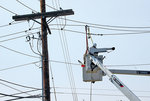More than 400 people who had accounts with the Jefferson County Public Utility District (PUD) are having those accounts sent to collections for failure to pay. The vast majority are power …
This item is available in full to subscribers.
We have recently launched a new and improved website. To continue reading, you will need to either log into your subscriber account, or purchase a new subscription.
If you had an active account on our previous website, then you have an account here. Simply reset your password to regain access to your account.
If you did not have an account on our previous website, but are a current print subscriber, click here to set up your website account.
Otherwise, click here to view your options for subscribing.
* Having trouble? Call our circulation department at 360-385-2900, or email our support.
Please log in to continue |
|


More than 400 people who had accounts with the Jefferson County Public Utility District (PUD) are having those accounts sent to collections for failure to pay. The vast majority are power bills.
It is the largest number of accounts heading to collections in the public utility’s history, and it goes hand in hand with its takeover of East Jefferson County’s electric system from Puget Sound Energy in April 2013.
PUD manager Jim Parker said that 620 account holders were advised in June 2014 to pay what they owed or face extra charges when a collection company is given the green light to take over the accounts. Approximately 100 people paid at that point, he said.
The PUD then opted to recheck and carry out what Parker called a “final scrubbing” to be sure the list was accurate.
In August, the PUD had handed over 420 accounts to Evergreen Financial of Yakima. The accounts owe anywhere from $300 to $700 each.
Parker did not have an exact total dollar amount owed, but said a ballpark estimate was more than $150,000.
As of last week, Evergreen Financial had given the PUD $300 of that sum.
“The law requires we make due diligence to get the public’s money. We can’t give a gift of government funds,” Parker said of needing to go through the process of trying to collect what is owed.
The PUD is not paying Evergreen Financial any money; the collection agency tacks its own fee onto the customer’s bill.
“This is for a year and a half in operation,” Parker said of the high number of accounts sent to collections this year. “It will drop, but we will continue to do this,” Parker said of sending customers to collections when they fail to pay for either water or power.
The vast majority of those accounts are likely for people who have moved out of Jefferson County and no longer are customers, Parker noted. Some of the customers have died, in which case their estates are being asked to pay. Some residences are in foreclosure.
There also are about 70 accounts for which the customer still may live in Jefferson County and has had their water or power shut off for sometime, Parker said. Most are properties that have been burned or on which there are no buildings, but there has been water or power for an RV, for example.
There are roughly nine accounts for homes that may be habitable, but that is not clear.
“It’s hard for us to say. I don’t think we have the right to go into people’s homes,” Parker said.
NEW TO THE PUD
Years ago, Parker said, it was more common for utility bills, primarily water bills, to be sent to the property owner, not the utility customer.
“If they didn’t pay, we would just turn them off until they did,” Parker said.
The payment burden has since been shifted to the utility consumer, and so the bill now follows the customer, not the property owner.
“Most of these people don’t live in Jefferson County anymore,” Parker said of the accounts being sent to collections.
Some people racked up bills for the first six months of PUD power operation; the PUD inherited overdue accounts and did not have a shutoff policy of its own until early 2014.
“A lot of people were here when PSE was here, and we were left holding the bag,” he said of the transition between the private and public utilities.
Being handed bad accounts was not the only problem the PUD had with billings. There were billing inaccuracies, and then PUD officials learned that they could not shut off power during the cold winter season – Nov. 15-March 15 – without proper notification.
A delay in communicating the rules to customers also meant there was a delay in the PUD shutting off customers’ power. As a result, some people racked up hundreds of dollars in electricity charges that they could not pay.
Parker acknowledged that he knows of one woman who still owes $2,000. He said the woman told the PUD that Olympic Community Action Programs (OlyCAP) has indicated it can’t help her with such a large bill, and the PUD also does not know a way to help.
In the meantime, shutoffs have dropped from a high of some 142 in one week earlier this year to two last week, Parker said.
RED, YELLOW, GREEN
The PUD also has instituted a policy of requiring a deposit to have power turned on if a new customer has no service history with the PUD.
“In the old days with water, we didn’t collect a deposit because it was hard to track,” Parker said. Because the PUD got stuck with accounts from PSE that had no clear deposit history, the PUD is subscribing to an online credit check service that specializes in utility history, he said.
The service uses Social Security numbers to comb its files to see if a person has been late or failed to pay a bill. It uses a red/yellow/green system to rate how customers pay.
“Red means they have a long history or there’s a concern, and we charge a $200 deposit” on those accounts, Parker said. If the services gives a person a yellow rating, it means there is no history, in which case the PUD charges a $100 deposit. A green rating means no payment problems, so no deposit is required.
WARNING NOTICE
The PUD also is changing the way it informs people of late payments. It had been inserting a pink notice with the second bill.
“We’ve decided to do a separate process. So now, you’ll get your first bill, then your second bill, and then the pink slip is sent separately,” Parker said.
The last, separate notice still warns the customer of an impending termination of service – a shutoff. After that notice, customers receive a call and then a notice on their door before the PUD line crew actually comes out and disconnects service, typically on a Wednesday.